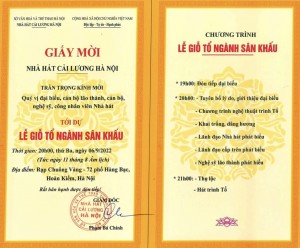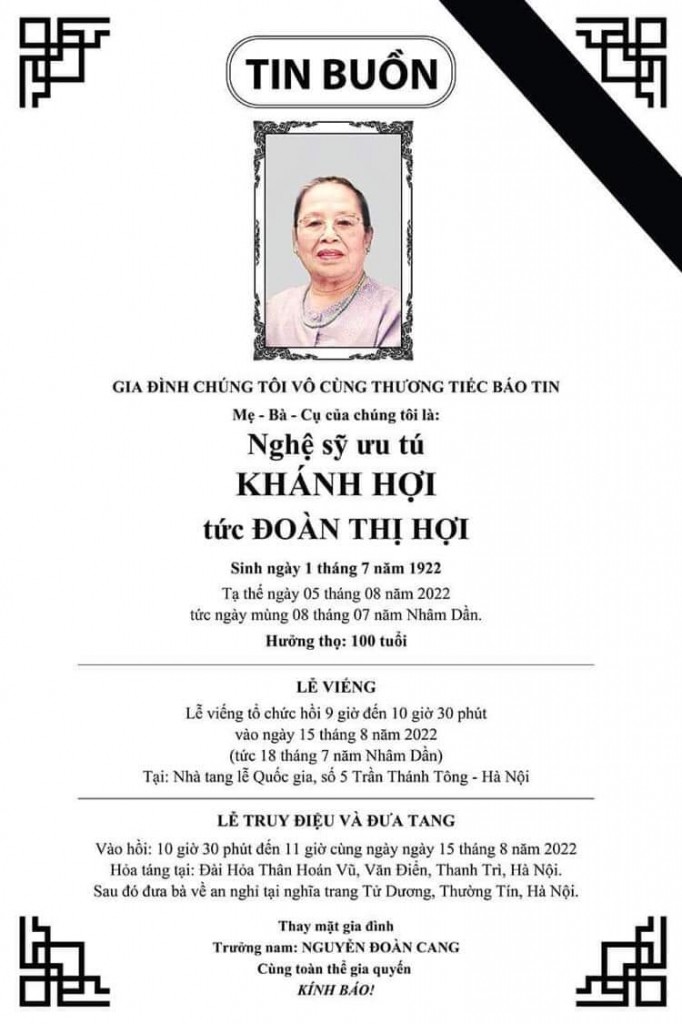Bài viết trong danh mục »Tin nhà hát «
Sáng ngày 12/9/2022, tại rạp Chuông Vàng, số 72 Hàng Bạc, Hoàn Kiếm, Hà Nội, Chi bộ Nhà hát Cải lương Hà Nội đã tổ chức Đại hội nhiệm kỳ 2022 – 2025.
Dự và chỉ đạo Đại hội có đồng chí Phạm Thị Mỹ Hoa – Phó Bí Thư Đảng ủy, Phó Giám đốc Sở Văn hóa và Thể thao Hà Nội, NSND Trung Hiếu – Ủy viên Ban Chấp hành Đảng ủy cơ quan Sở Văn hóa và Thể thao Hà Nội, cùng các đồng chí trong Cấp ủy Chi bộ và toàn thể đảng viên Chi bộ Nhà hát Cải lương Hà Nội .
Tính đến thời điểm hiện tại Chi bộ Nhà hát có 26 đảng viên (24 đảng viên chính thức, 02 đảng viên dự bị).
Nhạc sỹ Phạm Chỉnh – Bí thư Chi bộ nhiệm kỳ 2020 – 2022 báo cáo tổng kết nhiệm kỳ và kiểm điểm Chi ủy Chi bộ nhiệm kỳ 2020 – 2022:

Đại hội đã lắng nghe báo cáo tổng kết nhiệm kỳ 2020 – 2022 và đề ra phương hướng, nhiệm vụ nhiệm kỳ 2022 – 2025; trong đó, trọng tâm nhấn mạnh về công tác lãnh đạo, chỉ đạo thực hiện nhiệm vụ chính trị tại đơn vị.
Trong nhiệm kỳ 2020 – 2022 Chi bộ đã đoàn kết, nỗ lực vượt mọi khó khăn để hoàn thành tốt nhiệm vụ được giao, xây dựng tập thể Chi bộ đoàn kết, chủ động và tích cực trong công tác Đảng, chuyên môn và đoàn thể và nhận được nhiều hình thức khen thưởng của các cấp.
Đạt được những kết quả trên là do sự nỗ lực phấn đấu của cán bộ, đảng viên, các nghệ sỹ, công nhân viên và tập thể Cấp uỷ, lãnh đạo phòng/đoàn dưới sự chỉ đạo và quan tâm sâu sắc của Cấp uỷ cấp trên, của Lãnh đạo Nhà hát. Những kết quả đạt được trong nhiệm kỳ 2020-2022 là một bước tiến quan trọng để Chi bộ tiếp tục hoàn thành nhiệm vụ nhiệm kỳ 2022-2025.
Nhiệm vụ trọng tâm của Chi bộ Nhà hát Cải lương Hà Nội trong nhiệm kỳ tới là: Phổ biến, triển khai, giám sát có hiệu quả các chủ trương, đường lối của Đảng, chính sách và pháp luật của Nhà nước; Đẩy mạnh thực hiện Quy chế dân chủ, nêu cao tinh thần trách nhiệm của người đứng đầu, xây dựng và giữ gìn đoàn kết thống nhất trong Chi bộ, đơn vị; Phát triển Đảng, theo dõi, giám sát và đề xuất các quần chúng ưu tú để tạo nguồn và kết nạp đảng viên mới, phấn đấu kết nạp ít nhất 02 đảng viên mới; 100% đảng viên đủ tư cách, hoàn thành tốt nhiệm vụ, trong đó có 15% đảng viên đủ tư cách, hoàn thành xuất sắc nhiệm vụ; tập thể Chi bộ Nhà hát đạt danh hiệu “Chi bộ trong sạch vững mạnh”.
Về công tác chuyên môn, Chi bộ lãnh đạo xây dựng mục tiêu, kế hoạch thực hiện thắng lợi nhiệm vụ của đơn vị; Lãnh đạo chỉ đạo đơn vị đoàn kết, nâng cao trình độ chuyên môn nghiệp vụ; Tiếp tục đẩy mạnh thực hiện ứng dụng công nghệ thông tin trong triển khai nhiệm vụ …
Đại hội cũng đã bàn bạc, thảo luận, đề xuất các giải pháp thực hiện, phương hướng, nhiệm vụ và các chỉ tiêu cụ thể của Nghị quyết Đại hội Chi bộ nhiệm kỳ 2022 – 2025 nhằm: Xây dựng Chi bộ trong sạch, vững mạnh hoàn thành tốt mọi nhiệm vụ được giao; Đóng góp vai trò quan trọng vào sự phát triển, bảo tồn và đưa nghệ thuật Cải lương truyền thống đến gần hơn với công chúng…
Các đồng chí đảng viên Chi bộ phát biểu ý kiến tham luận:
Phát biểu chỉ đạo tại Đại hội, đồng chí Phạm Thị Mỹ Hoa – Phó Bí Thư Đảng ủy, Phó Giám đốc Sở Văn hóa và Thể thao Hà Nội ghi nhận và biểu dương những thành quả đạt được của Chi bộ Nhà Hát Cải lương Hà Nội trong nhiệm kỳ qua. Điểm sáng của Chi bộ là tính đoàn kết, sáng tạo vượt mọi khó khăn (do tu sửa rạp, ảnh hưởng của dịch Covid – 19…) để hoàn thành tốt các nhiệm vụ được giao. Đồng chí Phạm Thị Mỹ Hoa nhấn mạnh trong nhiệm kỳ mới Chi bộ cần cụ thể hóa các nhiệm vụ, mục tiêu của đơn vị. Cần nhận diện rõ các cơ hội và thách thứ, đẩy mạnh công tác lãnh đạo, chỉ đạo của Chi bộ, đảm bảo an ninh, an toàn, PCCC…. Tiếp tục kiện toàn bộ máy lãnh đạo, nhân sự của các Phòng/đoàn theo quy định; đa dạng phong cách, nâng cao chất lượng biểu diễn nghệ thuật… phấn đấu hoàn thành xuất sắc nhiệm vụ được giao.

Đồng chí Phạm Thị Mỹ Hoa – Phó Bí Thư Đảng ủy, Phó Giám đốc Sở Văn hóa và Thể thao Hà Nội phát biểu chỉ đạo Đại hội

NSND Trung Hiếu – Ủy viên Ban Chấp hành Đảng ủy cơ quan Sở Văn hóa và Thể thao Hà Nội trao đổi, gợi ý một số giải pháp nâng cao hiệu quả biểu diễn nghệ thuật truyền thống


Chi bộ tiến hành biểu quyết các nội dung và bỏ phiếu theo quy định
Với tinh thần phát huy dân chủ, đoàn kết và thống nhất cao. Đại hội đã sáng suốt lựa chọn, bầu các đồng chí có đủ năng lực, phẩm chất và trí tuệ vào Chi ủy Chi bộ nhiệm kỳ 2022 – 2025; Nhạc sỹ Phạm Chỉnh – Giám đốc, Bí thư Chi bộ Nhà hát nhiệm kỳ 2020 – 2022 được Đại hội tín nhiệm bầu, tái cử giữ chức vụ Bí thư Chi bộ nhiệm kỳ 2022 – 2025; đồng chí Nguyễn Quỳnh Chi – Phó Giám đốc Nhà hát giữ chức vụ Phó Bí thư Chi bộ nhiệm kỳ 2022 – 2025; đồng chí Lê Thị Hồng Nhung – Phó trưởng Đoàn Chuông Vàng giữ chức vụ Chi ủy viên nhiệm kỳ 2022 – 2025.

Đồng chí Phạm Thị Mỹ Hoa – Phó Bí Thư Đảng ủy, Phó Giám đốc Sở Văn hóa và Thể thao Hà Nội tặng hoa chúc mừng Chi ủy Nhà hát Cải lương Hà Nội nhiệm kỳ 2022 – 2025:

Đồng chí Phạm Thị Mỹ Hoa – Phó Bí Thư Đảng ủy, Phó Giám đốc Sở Văn hóa và Thể thao Hà Nội và Chi ủy Chi bộ Nhà hát Cải lương Hà Nội nhiệm kỳ 2022 – 2025 tặng hoa cảm ơn những đóng góp của đồng chí Thái Hoàng Ngân – Phó Bí thư Chi bộ Nhà hát nhiệm kỳ 2020 – 2022
Sau buổi sáng làm việc hết sức tập trung, dân chủ và đoàn kết, Đại hội Chi bộ Nhà hát Cải lương Hà Nội nhiệm kỳ 2022 – 2025 đã thành công tốt đẹp./.

Sáng ngày 09/9/2022, tại Rạp Chuông Vàng, số 72 Hàng Bạc, Hoàn Kiếm, Hà Nội, Chi bộ Nhà hát Cải lương Hà Nội đã tổ chức Phiên họp trù bị Đại hội nhiệm kỳ 2022-2025.
Tham dự có Nhạc sỹ Phạm Chỉnh – Bí thư Chi bộ, Giám đốc Nhà hát; các đồng chí trong Chi ủy chi bộ; Ban Giám đốc và đảng viên Chi bộ.
Sau buổi sáng làm việc nghiêm túc, tập trung và hiệu quả, Chi bộ đã thực hiện đầy đủ các nội dung phục vụ Đại hội trên tinh thần dân chủ và đúng quy định của Đảng.
Tại phiên họp, các đại biểu đã thông qua Quy chế làm việc của Đại hội; bầu Đoàn Chủ tịch, tổ Thư ký, tổ Thẩm tra tư cách đại biểu; thông qua Chương trình làm việc Đại hội, Quy chế bầu cử tại Đại hội, Báo cáo thẩm tra tư cách đại biểu.
Theo chương trình, Phiên chính thức Đại hội Chi bộ Nhà hát Cải lương Hà Nội sẽ diễn ra vào sáng ngày 12/9/2022./.


Thực hiện các Quyết định số: 1910 và 1911 ngày 15/8/2022 của Đảng ủy cơ quan Sở Văn hóa và Thể thao Hà Nội về việc kết nạp đảng viên. Sáng ngày 09/9/2022, tại Rạp Chuông Vàng, số 72 Hàng Bạc, Hoàn Kiếm, Hà Nội, Chi bộ Nhà hát Cải lương Hà Nội đã tổ chức lễ kết nạp cho 02 quần chúng ưu tú: Nguyễn Thị Hải – Chuyên viên Phòng Hành chính – Tổng hợp và Nguyễn Phú Hải – Diễn viên Đoàn Hoa Mai vào Đảng.
Tham dự buổi Lễ có Nhạc sỹ Phạm Chỉnh – Bí thư Chi bộ, Giám đốc Nhà hát; các đồng chí trong Chi ủy chi bộ; Ban Giám đốc; đại diện đoàn thể Công đoàn, Đoàn thanh niên, các quần chúng ưu tú và toàn thể đảng viên Chi bộ.
Trong không khí trang nghiêm, sau khi các đồng chí đảng viên mới đọc lời tuyên thệ, Nhạc sỹ Phạm Chỉnh – Bí thư Chi bộ, Giám đốc Nhà hát thay mặt Chi ủy Chi bộ nói rõ nhiệm vụ, quyền hạn của người đảng viên để đảng viên mới nắm rõ và nghiêm túc thực hiện đồng thời phân công đảng viên chính thức tiếp tục giáo dục, giúp đỡ đảng viên dự bị trở thành đảng viên chính thức theo quy định của Đảng./.
Tối ngày 06/9/2022 (tức ngày 11/8 Âm lịch), tại Rạp Chuông Vàng, số 72 Hàng Bạc, Hoàn Kiếm, Hà Nội. Nhà hát Cải lương Hà Nội long trọng tổ chức Lễ dâng hương Tổ nghiệp Ngành Sân khấu.
Tới dự buổi Lễ có đồng chí Phạm Thị Mỹ Hoa – Phó Giám đốc Sở Văn hóa và Thể thao Hà Nội cùng các đồng chí đại diễn lãnh đạo các Phòng, Ban, đơn vị nghệ thuật trực thuộc Sở;
Nhà hát Cải lương Hà Nội cũng vinh dự được tiếp đón NSND Trần Quốc Chiêm – Chủ tịch Hội Liên hiệp Văn học Nghệ thuật Hà Nội; NSND Triệu Trung Kiên – Giám đốc Nhà hát Cải lương Việt Nam; NSND Nguyễn Hoàng Tuấn – Chủ tịch Hội Sân khấu Hà Nội; các cán bộ, nghệ sỹ lão thành và đông đảo quý vị khán giả tới dự buổi Lễ.

Phát biểu khai mạc, Nhạc sỹ Phạm Chỉnh – Giám đốc Nhà hát gửi lời cảm ơn đến các đồng chí lãnh đạo Sở VH&TT Hà Nội, các cán bộ, nghệ sỹ lão thành, các đơn vị bạn đã quan tâm, tạo điều kiện và giúp đỡ để Nhà hát hoàn thành tốt các nhiệm vụ được giao và cho biết: Sau thời gian cải tạo, sửa chữa Rạp và do ảnh hưởng của dịch Covid – 19, đến năm nay Nhà hát mới tổ chức được Lễ dâng hương Tổ nghiệp Ngành Sân khấu tại Rạp Chuông Vàng.
Một số hình ảnh Lễ Khai trống – Dâng hương:




Nhạc sỹ Phạm Chỉnh – Giám đốc Nhà hát báo cáo nhanh về thành tích hoạt động Nhà hát đã đạt được trong thời gian qua. Bên cạnh việc hoàn thành tốt chương trình biểu diễn nghệ thuật phục vụ các nhiệm vụ chính trị, dàn dựng các tác phẩm mới, phục dựng những tác phẩm có giá trị lịch sử, biểu diễn chương trình nghệ thuật “Tiếng quê hương” phục vụ du khách và khán giả tại cửa Rạp Chuông Vàng vào tối thứ 6, 7 hàng tuần … Toàn thể cán bộ, nghệ sỹ, CNV Nhà hát luôn tích cực học tập, nghiên cứu, nâng cao trình độ chuyên môn, đoàn kết góp phần xây dựng Nhà hát Cải lương Hà Nội thực sự trở thành một tập thể vững mạnh.

NSND Trần Quốc Chiêm – Chủ tịch Hội Liên hiệp Văn học Nghệ thuật Hà Nội bày tỏ sự vui mừng khi đến dự buổi Lễ và đề nghị các Nghệ sỹ Nhà hát tiếp tục cố gắng phấn đấu hoàn thành tốt các nhiệm vụ được giao, trước mắt là nhiệm vụ tham gia và đạt thành tích cao tại các Liên hoan sân khấu Cải lương năm 2022.

Các nghệ sỹ lão thành bày tỏ sự xúc động và gửi lời cảm ơn đến Ban Giám đốc Nhà hát đã tổ chức buổi Lễ long trọng và ấm áp.

Các tiết mục biểu diễn nghệ thuật:




Căn cứ Kế hoạch hoạt động năm 2022, Nhà hát Cải lương Hà Nội thông báo lịch tổ chức LỄ GIỖ TỔ NGÀNH SÂN KHẤU, cụ thể như sau:
* Thời gian: 20h00’ thứ Ba. ngày 06/9/2022 (tức ngày 11 tháng 8 Âm lịch).
* Địa điểm: Rạp Chuông Vàng, 72 phố Hàng Bạc, Hoàn Kiếm, Hà Nội.
(có Giấy mời và nội dung chương trình kèm theo)
Trân trọng thông báo và kính mời Quý vị đại biểu, cán bộ lão thành và lãnh đạo, cán bộ, diễn viên, CNV Nhà hát tới dự để buổi Lễ được tổ chức thành công tốt đẹp./.

Tối ngày 19/8/2022 tại sân khấu xã Hồng Hà, Nhà hát Cải lương Hà Nội đã phối hợp UBND huyện Đan Phượng tổ chức biểu diễn chương trình nghệ thuật kỷ niệm 77 năm Ngày Cách mạng tháng Tám (19/8/1945 – 19/8/2022) và Quốc khánh nước CHXHCN Việt Nam (02/9/1945 – 02/9/2022).
⚡ Tới dự và chỉ đạo chương trình nghệ thuật có: Nhạc sỹ Phạm Bá Chỉnh – Giám đốc Nhà hát; cùng các cán bộ, nghệ sỹ, CNV Nhà hát Cải lương Hà Nội tham gia biểu diễn.
Đại biểu huyện Đan Phượng có các đồng chí lãnh đạo Huyện ủy, HĐND, UBND, UB MTTQ Việt Nam huyện Đan Phượng, đại diện các Phòng, ban, ngành của huyện; các đồng chí lãnh đạo Đảng ủy, UBND, UB MTTQ Việt Nam của các xã trên địa bàn huyện.
Đặc biệt là sự có mặt của gần 1000 khán giả đón xem và cổ vũ chương trình.


Nhạc sỹ Phạm Bá Chỉnh – Giám đốc Nhà hát nhận hoa chúc mừng của lãnh đạo huyện Đan Phượng
⚡ Với nội dung chào mừng Ngày kỷ niệm và thể hiện tình cảm sâu sắc tha thiết, lòng biết ơn đối với Đảng, Bác Hồ kính yêu, ca ngợi tình yêu quê hương, đất nước, ca ngợi gương anh hùng, dũng cảm, kiên trung, bất khuất của dân tộc trong công cuộc đấu tranh bảo vệ và xây dựng Tổ quốc đã mang lại cho khán giả một đêm thưởng thức nghệ thuật đầy ý nghĩa, góp phần tuyên truyền tới quần chúng nhân dân về tầm quan trọng và ý nghĩa lịch sử của Ngày cách mạng tháng Tám và Quốc khánh nước CHXHCN Việt Nam.
⚡ Chương trình do tập thể nam, nữ nghệ sỹ diễn viên Nhà hát Cải lương Hà Nội biểu diễn với các tiết mục Ca- Múa – Nhạc, trích đoạn Cải lương mang đậm bản sắc dân tộc; các tiết mục độc tấu, hòa tấu của dàn nhạc dân tộc… được dàn dựng công phu với sự tham gia của các Nghệ sĩ cùng nhóm múa Nhà hát Cải lương Hà Nội.
⚡ Những tràng pháo tay không ngớt, những bó hoa tươi thắm của khán giả tặng sau mỗi tiết mục biểu diễn là món quà tinh thần lớn nhất cho các nghệ sỹ tham gia biểu diễn.
Một số hình ảnh:












TIN BUỒN
Nhà hát Cải lương Hà Nội vô cùng thương tiếc báo tin:
Nghệ sỹ ưu tú Khánh Hợi (tức Đoàn Thị Hợi) – nguyên là diễn viên Đoàn Cải Lương Chuông Vàng
- Sinh ngày 01/7/1922
- Tạ thế ngày 05/8/2022 (tức ngày mồng 8 tháng 7 năm Nhâm Dần)
- Hưởng thọ: 100 tuổi
Lễ viếng: tổ chức từ 09h00 đến 10h30 ngày 15/8/2022 (tức ngày 18 tháng 7 năm Nhâm Dần) tại Nhà tang lễ Quốc gia, số 5 Trần Thánh Tông – Hà Nội
Lễ truy điệu và đưa tang: tổ chức từ 10h30 đến 11h30 cùng ngày
Hỏa táng tại Đài hóa thân Hoàn Vũ – Văn Điển – Thanh Trì – Hà Nội
Trân trọng Thông báo./.

Thực hiện kế hoạch số 47/NHCLHN ngày 5/4/2022 của Nhà hát Cải lương Hà Nội về việc “Bồi dưỡng nâng cao chuyên môn cho các diễn viên có triển vọng năm 2022”.
Sáng ngày 10/8/2022 tại rạp Chuông Vàng, số 72 Hàng Bạc, Hoàn Kiếm. Phòng Tổ chức biểu diễn và Nghệ thuật phối hợp Ban Chuyên môn Nhà hát tổ chức sát hạch chuyên môn cho diễn viên có triển vọng.
Tới dự có đồng chí Nguyễn Quỳnh Chi – Phó giám đốc Nhà hát, các thành viên hội đồng Nghệ thuật Nhà hát và cán bộ các Phòng, Đoàn.
Tại buổi sát hạch, các diễn viên trẻ của Nhà hát đã biểu diễn các trích đoạn: (màn cuối – vở “Truân chuyên dải yếm đào”); (màn cuối – vở “Truân chuyên dải yếm đào”); (màn 2 – trong vở “Thiên mệnh”); VC: Sân ga chỉ có một người; Tình sử: Trương Chi – Mỵ Nương; VC: Nỗi lòng Thái hậu; Tình hận Dương Quý Phi; vai Hân (Cảnh 4 – nhà ông Phương).
Kết thúc buổi sát hạch, Hội đồng Nghệ thuật Nhà hát đánh giá cao sự nỗ lực tập luyện và đề nghị các nghệ sỹ trẻ tiếp tục cố gắng, phát huy được các điểm mạnh, khác phục một số hạn chế trong phong cách biểu diễn và mong muốn các nghệ sỹ trẻ sớm trở thành lớp kế cận, góp phần phát triển và đưa nghệ thuật Cải lương truyền thống đến gần hơn với công chúng.
Một số hình ảnh:















Thực hiện Kế hoạch số 432/KH-SVHTT ngày 29/7/2022 của Sở Văn hóa và Thể thao Hà Nội về việc tổ chức các hoạt động biểu diễn nghệ thuật kỷ niệm 77 năm Ngày Cách mạng tháng Tám (19/8/1945 – 19/8/2022) và Quốc khánh nước CHXHCN Việt Nam (02/9/1945 – 02/9/2022). Nhà hát Cải lương Hà Nội tổ chức biểu diễn chương trình nghệ thuật phục vụ Ngày kỷ niệm với chủ đề “NHỚ MÙA THU LỊCH SỬ”

- Thời gian: 20h00 ngày 19/8/2022
- Địa điểm: Sân khấu xã Hồng Hà, huyện Đan Phượng, thành phố Hà Nội
⚡ Chỉ đạo nghệ thuật: Nhạc sỹ Phạm Chỉnh – Giám đốc Nhà hát
⚡ Chương trình do tập thể nam, nữ nghệ sỹ diễn viên Nhà hát Cải lương Hà Nội biểu diễn với các tiết mục Ca- Múa – Nhạc, trích đoạn Cải lương mang đậm bản sắc dân tộc; các tiết mục độc tấu, hòa tấu của dàn nhạc dân tộc… được dàn dựng công phu với sự tham gia của các Nghệ sĩ NSND, NSƯT, các Nghệ sĩ trẻ cùng nhóm múa Nhà hát Cải lương Hà Nội.
⚡ Với nội dung chào mừng Ngày kỷ niệm và thể hiện tình cảm sâu sắc tha thiết, lòng biết ơn đối với Đảng, Bác Hồ kính yêu, ca ngợi tình yêu quê hương, đất nước, ca ngợi gương anh hùng, dũng cảm, kiên trung, bất khuất của dân tộc trong công cuộc đấu tranh bảo vệ và xây dựng Tổ quốc sẽ mang lại cho khán giả những cảm xúc về một giai đoạn lịch sử hào hùng của dân tộc, góp phần đưa nghệ thuật Cải lương truyền thống đến gần hơn với công chúng và khán giả Thủ đô.
Trân trọng thông báo và kính mời khán giả Thủ đô đón xem./.
Nằm trong chuỗi các hoạt động kỷ niệm 75 năm Ngày Thương binh – Liệt sỹ (27/7/1947 – 27/7/2022), tối ngày 25/7/2022 Nhà hát Cải lương Hà Nội đã phối hợp Ủy ban nhân dân huyện Thanh trì tổ chức biểu diễn chương trình nghệ thuật kỷ niệm phục vụ nhân dân với chủ đề “LỜI CA TRI ÂN” tại sân sân khấu ngoài trời Nhà văn hóa Thôn 2, xã Vạn Phúc, huyện Thanh Trì.
⚡ Chỉ đạo nghệ thuật: Nhạc sỹ Phạm Bá Chỉnh – Giám đốc Nhà hát.
Tới dự có đồng chí Nguyễn Quỳnh Chi – Phó Giám đốc Nhà hát cùng các đồng chí cán bộ chủ chốt và các nghệ sỹ, CBCNV Nhà hát tham gia biểu diễn.
Đại biểu huyện Thanh Trì có các đồng chí là đại diễn lãnh đạo các Phòng, Ban, Ngành, Hội đoàn thể của huyện Thanh Trì và xã Vạn Phúc.
⚡ Chương trình do tập thể nam, nữ nghệ sỹ diễn viên Nhà hát Cải lương Hà Nội biểu diễn với các tiết mục Ca – Múa – Nhạc, trích đoạn Cải lương mang đậm bản sắc dân tộc; các tiết mục độc tấu, hòa tấu của dàn nhạc dân tộc… được dàn dựng công phu với sự tham gia của các Nghệ sĩ: NSND Thanh Hương, NSƯT Hoàng Viện… các Nghệ sĩ trẻ cùng nhóm múa Nhà hát Cải lương Hà Nội.
Một số hình ảnh:























